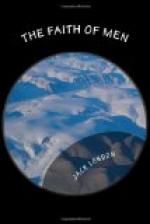“You don’t like me,” she said simply.
He smiled, helped her on with her parka, and led her to the door. “Only too well, Jees Uck,” he said softly; “only too well.”
After that the pall of the Arctic night fell deeper and blacker on the land. Neil Bonner discovered that he had failed to put proper valuation upon even the sullen face of the murderous and death-stricken Amos. It became very lonely at Twenty Mile. “For the love of God, Prentiss, send me a man,” he wrote to the agent at Fort Hamilton, three hundred miles up river. Six weeks later the Indian messenger brought back a reply. It was characteristic: “Hell. Both feet frozen. Need him myself—Prentiss.”
To make matters worse, most of the Toyaats were in the back country on the flanks of a caribou herd, and Jees Uck was with them. Removing to a distance seemed to bring her closer than ever, and Neil Bonner found himself picturing her, day by day, in camp and on trail. It is not good to be alone. Often he went out of the quiet store, bare-headed and frantic, and shook his fist at the blink of day that came over the southern sky-line. And on still, cold nights he left his bed and stumbled into the frost, where he assaulted the silence at the top of his lungs, as though it were some tangible, sentiment thing that he might arouse; or he shouted at the sleeping dogs till they howled and howled again. One shaggy brute he brought into the post, playing that it was the new man sent by Prentiss. He strove to make it sleep decently under blankets at nights and to sit at table and eat as a man should; but the beast, mere domesticated wolf that it was, rebelled, and sought out dark corners and snarled and bit him in the leg, and was finally beaten and driven forth.
Then the trick of personification seized upon Neil Bonner and mastered him. All the forces of his environment metamorphosed into living, breathing entities and came to live with him. He recreated the primitive pantheon; reared an altar to the sun and burned candle fat and bacon grease thereon; and in the unfenced yard, by the long-legged cache, made a frost devil, which he was wont to make faces at and mock when the mercury oozed down into the bulb. All this in play, of course. He said it to himself that it was in play, and repeated it over and over to make sure, unaware that madness is ever prone to express itself in make-believe and play.
One midwinter day, Father Champreau, a Jesuit missionary, pulled into Twenty Mile. Bonner fell upon him and dragged him into the post, and clung to him and wept, until the priest wept with him from sheer compassion. Then Bonner became madly hilarious and made lavish entertainment, swearing valiantly that his guest should not depart. But Father Champreau was pressing to Salt Water on urgent business for his order, and pulled out next morning, with Bonner’s blood threatened on his head.




